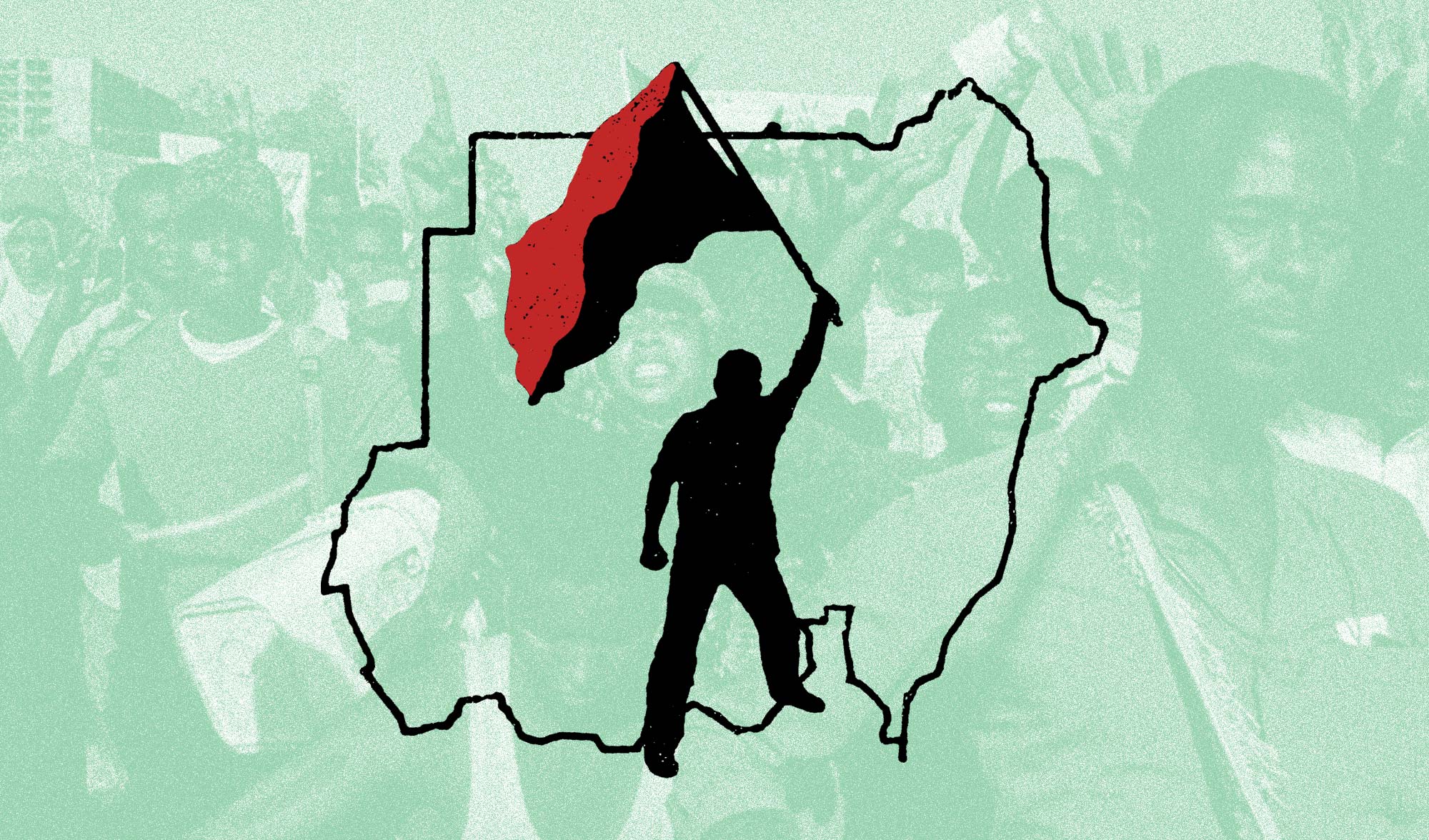In 2024, Black Rose/Rosa Negra’s International Relations Committee began working closely with anarchist revolutionaries in Sudan. This relationship has involved the exchange of ideas, practical advice, and support.
Earlier in 2025, Black Rose/Rosa Negra organized a campaign to raise $20,000 USD on behalf of our Sudanese comrades, which they have since used to purchase a printing press.
In this article, developed in consultation with our Sudanese comrades, we provide a written account of how the organization now known as the Anarchist Group in Sudan (AGS) came into being.
By Morgan P.
The Sudanese Revolution was one of the great revolutionary upsurges of the 21st century. Like all too many of our great revolutions it has — for the moment at least — been throttled in blood and dictatorship. But also like all great revolutions, it was a crucible that forged significant new political ideologies and tendencies.
While anarchism is not new to Africa, like in many other parts of the world it has struggled recently to go beyond being an intellectual tradition or a lifestyle and toward becoming a living movement with substantial strategic recommendations. Through fully throwing themselves into the social movements that drove the Sudanese Revolution while simultaneously growing their own formal political organization, anarchists in Sudan have been able to develop a revolutionary practice that has real meaning for class struggle in their country. Despite their conditions being far different from ours here in the US, we can still learn valuable lessons from their experiences both in the process of revolutionary struggle, and in the current state of surviving under civil war and intense repression.
Before the outbreak of mass street protest in December 2018, Sudan had already been experiencing simmering opposition to the dictatorship of Omar al-Bashir and the crushing economic conditions that the people faced under his rule. And this atmosphere of successive outbursts of student and worker protests encouraged young student activists to study and look for ideologies that would help them overcome the many obstacles they faced. It was in this period that some of the founding members of the Anarchist Group in Sudan (AGS) first found anarchism, and that they founded the organization as a small group of five comrades in April 2017.
The AGS was initially a small student organization, and they began by focusing their efforts on establishing a foundation in Sudanese colleges. They organized secretly, and concentrated on the smaller, more peripheral campuses where the eye of the state would not be so intense. Within the context of the Sudanese opposition, clandestinity was common practice. AGS itself strategically avoided direct confrontation with power, with its members instead attempting to immerse themselves in spaces of broad popular struggle, particularly student unions. The reach of the group grew as they came into contact with more young activists seeking alternatives to the failed and stale political ideologies of yesterday.
As the organization grew, it attracted professionals such as lawyers and engineers — which was, through the Sudanese Professionals Association, a prominent organization representing a specific class layer driving the Revolution. The AGS began emphasizing recruitment more, and spread across many universities, and achieved influence within the coalition of student unions. As they grew, they used the name “Anarchist Federation of Sudan”, which a number of their statements appear online under, but ended up using the term “group” rather than “federation” as they operated as a single unitary organization.
The founding and initial growth of the AGS was well-timed to match the explosion of the Sudanese Revolution in December 2018. The Revolution was led by grassroots social movements such as workers unions, student unions, women’s organizations, and the neighborhood-based resistance committees.
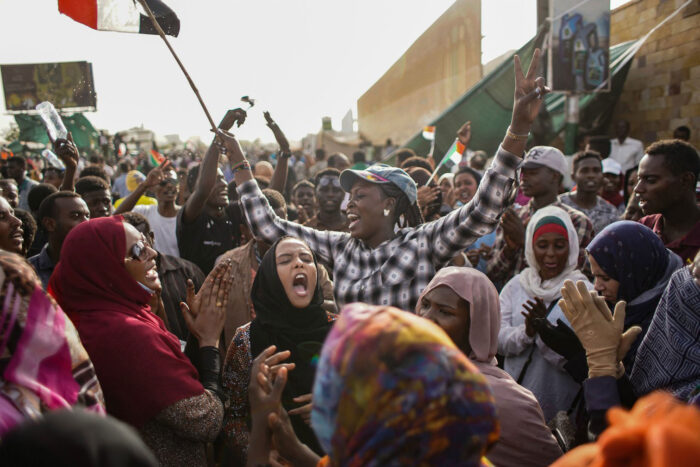
The resistance committees are of particular note. Similar to the local coordination committees of the 2011 Syrian Revolution, the Sudanese resistance committees are essentially small groups of neighbors self-organized to participate in protest and the revolutionary process. Networking together as hundreds of local committees, they formed the fabric of the movement to overthrow al-Bashir. We see them as a classic example of popular power in practice, as neighbors confront state power and simultaneously begin taking control over their own neighborhood and creating the organizational structures of self-management that could replace the state.
The AGS actively worked in the resistance committees and student organizations during the first months of the Revolution while still staying underground. Militants were able to advocate for anarchist positions and influence the direction of groups without publicly announcing themselves as anarchists. Through participating in this mass upsurge in self-organization coupled with mass street confrontation, anarchism moved from an idea into a lived strategic practice. They saw anarchism as a pragmatic way to involve themselves in social struggle while contesting all of the authoritarian forces that oppress the Sudanese people, whether it be tribal, cultural, military, religious — a comprehensive struggle against all this and for freedom and individual rights.
The strategies proposed by anarchists in Sudan are unprecedented in addressing the complex social crisis. The principle of rejecting even small, grassroots authorities—such as tribal domination and racism based on ethnicity—forms the core of dismantling power structures in Sudanese society. This has psychological effects on the individual and social consequences that may bring them into direct confrontation with entrenched authority. However, we believe that freedom is indivisible, and every individual deserves to be free—even outside institutional power, including power within one’s own behavior. Authority is a social behavior rooted in the individual’s desire to monopolize violence and deprive others of freedom.
— Member of AGS during dialogue with members of BRRN, September 2025
Within the resistance committees, the AGS coordinated anarchist activity to push the committees in a more anti-authoritarian direction. The resistance committees were in many ways an organic expression of existing Sudanese society — the basic elements of solidarity and mutual aid that have been necessary to survive in a country where the government provides nothing for the survival of the people. While this gave them strength, it also meant that a lot of work needed to be done to give them the organized power and vision to challenge the state. The AGS worked, for example, to expand the nature of many committees from being more limited groups with a selected membership and president, vice-president, etc., into being open to everyone in the neighborhood to join and participate.
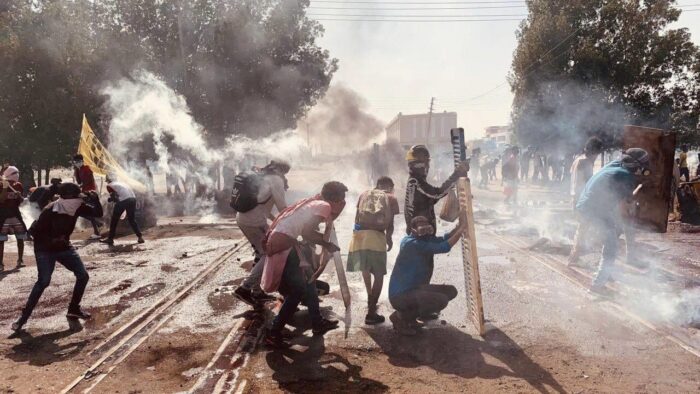
Alongside the practical organizing work, the AGS initiated the organization of “thinking circles” to discuss anarchist ideas and worked on making anarchists texts available in Arabic. They put their modest membership dues to use printing anarchist pamphlets and organizing university events.
While the Sudanese social movements succeeded in overthrowing al-Bashir by April, the military took control of the government and the struggle deepened. On June 3rd, 2019, government forces conducted a massacre of a sit-in protest in Khartoum, martyring more than 100 and raping more than 70. This was just the largest of many massacres during this time, when many protesters and comrades were murdered by state forces. Workers responded to the June 3rd Khartoum massacre with a general strike that shut down the country, and brought the military leadership to the negotiating table. It was in this context, of a country on the brink, with the resistance committees taking control of territory, that the AGS first announced themselves to the public during a massive march in Khartoum on June 30th.
Predictably, they faced a large backlash after publicly declaring themselves as an anarchist organization. But because they had embedded themselves within the student unions and the resistance committees, and made themselves known to their fellow students and neighbors as committed comrades with sensible ideas, they were able to gain many new members. Many youth who were disillusioned in the false choices presented by the so-called leaders — including the “national liberation” state communists who had propped up the dictatorship — were drawn to the principled stand for freedom of the anarchists.
However, anarchism in Sudan was not able to grow freely for long. The mass uprising achieved a historic victory in forcing out the military dictatorship in July 2019, with a compromise civilian-military transitional government put in place. But this was an inherently unstable solution, and the military and ‘Rapid Support Forces’ (RSF) together led a counter-revolution in October 2021 that brought a renewal of harsh dictatorship.1 This too was an unstable solution, and the RSF and Sudanese Armed Forces (SAF) fell out in a power struggle and initiated a civil war in April 2023. The tragedies that have spread across the country since then are too deep and numerous to detail in this account.
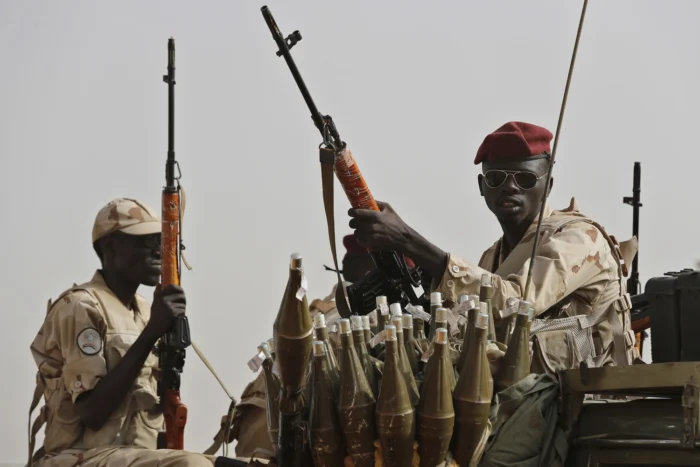
The civil war, which has deep roots in both the legacies of British colonialism and in local histories of domination, is also a war for Black survival against attempted genocide. Ruling powers in Sudan, particularly the RSF, are Arab supremacists who seek to dominate and ethnically cleanse dark-skinned Sudanese ethnic groups from their lands. Our comrades report that slavery is being perpetrated against Black people in Sudan, and so they see the current struggle as one for liberation from racial authoritarianism.
As the revolutionary movement continued a bitter struggle against the return of military power, this period has seen many martyrs, including anarchist comrades such as Omar Habbash, a doctor in Al Fashir, Sara, a leading activist in Khartoum, and others. Comrades, wherever they are, are constantly under threat of prison – which generally means death within a month. Faced with these losses, the AGS is committed to continuing their struggle with selflessness and determination. As armed conflict spread, anarchist comrades had two general approaches – to fight with independent resistance militias that attempt to defend the people from the ravages of the RSF and Sudanese Armed Forces, or to focus on avoiding armed confrontation through planting ideas and organizing at the grassroots to grow the movement. The AGS supports both strategic approaches currently.
With the country being ripped apart in a proxy war by external powers like the United Arab Emirates and Egypt intent on exploiting its natural resources, as some seven different military factions unleash terror on the Sudanese people, the AGS has nonetheless survived. Members have been scattered as internal and sometimes external refugees, but have managed to stay in contact and coordinate. When possible, they help run communal kitchens, they help refugees reach safety, they provide medical care, they support resistance militias, and they continue anarchist propaganda whenever possible.
Black Rose / Rosa Negra has been coordinating solidarity for the AGS together with our comrade organizations in the International Coordination for Organized Anarchism (ICOA), in particular Die Plattform in Germany and Union Communiste Libertaire in France. Along with smaller initiatives, a public fundraising campaign riased more than $20,000 USD to support AGS in their purchasing an industrial printing press to use for both spreading anarchist propaganda and for providing a means of economic self-support. While the printing press has not yet been put into full operation due to the always-shifting front lines and waves of repression behind the lines, it is a symbol of the AGS’ determination that continuing revolutionary anarchist struggle is a practical necessity, even in the midst of one of the planet’s worst humanitarian catastrophes.
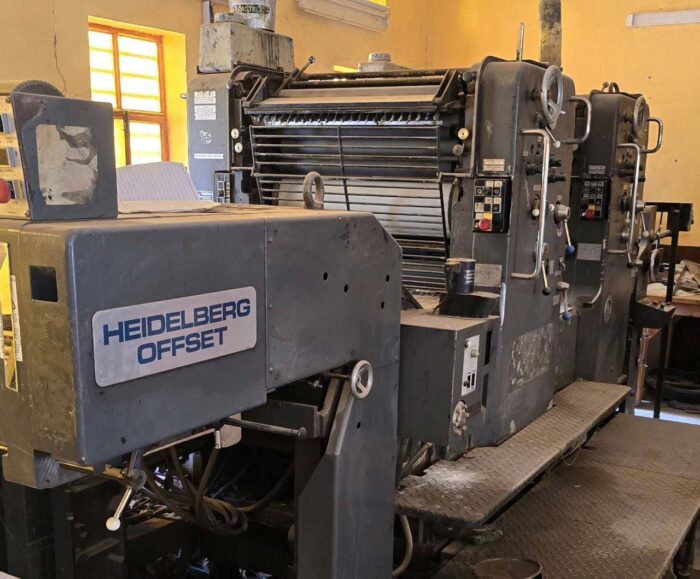
Anarchists in Sudan believe that international solidarity will be critical in ending the conflict, particularly focusing on those powers that are fueling the civil war:
Combating foreign [state] intervention in Sudan’s war requires a global uprising of struggling networks to expose the entities profiting from the blood of the people—not only in Sudan but across the region. Ideally, their own populations should stand against them to stop the bloodshed in exchange for wealth accumulation. Everyone can contribute to exposing this crime of war sponsorship in their own locations and raise awareness among people that the war in Sudan can stop if the external support for it ends—then peace will follow.
— Member of AGS during dialogue with members of BRRN, September 2025
The political goal of the AGS now is, in the most immediate term, the end of the war and of the massacres committed by both the RSF and army. In the longer term, they continue struggling to overcome the tribal and ethnic divisions that have been exacerbated by racist colonialism to win the social revolution and create a self-managed socialist and feminist society in Sudan and throughout Africa.
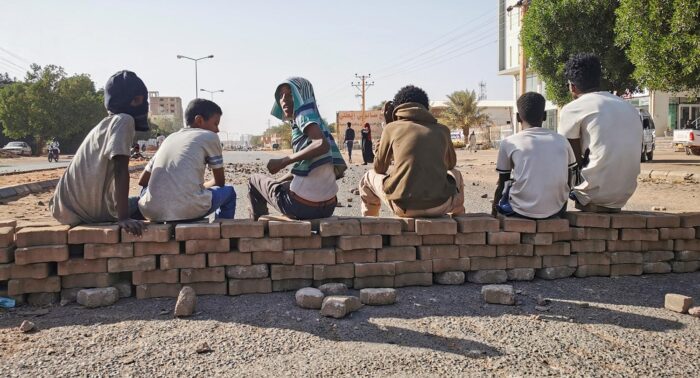
As revolutionaries in the imperialist core, our lives are far removed from that of our comrades in Sudan. Nonetheless, we have much to learn from their experiences inserting themselves into the base a mass movement, transforming anarchism into a lived practice that is meaningful for the lives of working class people, acting collectively as a political force to influence the direction of movement struggle, and their determination to continue anarchist struggle even in the most challenging conditions. Support for our comrades in Sudan is important for all of us who want to see anarchism reborn as a true force for global liberation.
Notes
- The Rapid Support Forces (RSF) was initiated as a paramilitary group primarily composed of Janjaweed tribesmen. Previously it acted as an auxiliary force of the Sudanese state and was used by the military Junta which took power in 2019 to violently suppress popular protests. Since 2023 it has been in armed conflict with the Sudanese Armed Forces (SAF). ↩︎

